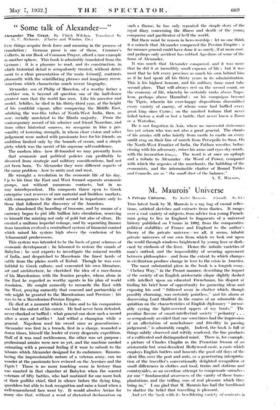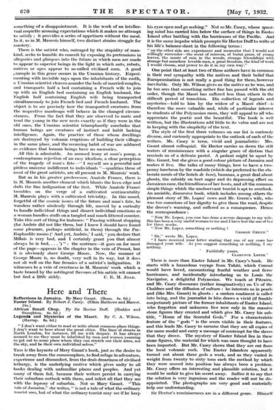M. Mauro i s ' Universe .1 Private Universe. By Ando', Mainnis. (Cassell.
is. 6,1-) Tins latest book by M. Maurois is a rug bag of casual mike- tions, satirical sketches and extracts frown diaries. It ranges. 01T-1' Z.I.vast variety of subjects, from AdVice to a young French- man going to live in England to fragments of u -emit history publikhed on Uranus in 1992, front the continuative political stabilities of Fiance and England to the auditor's theory of the Private 'universe—we all, it seems, inhabit: private universes of our own from which we look out upon the world through windows brightened by. young love or dark- ened by cirrhosis of the liver. Hence the infinite varieties of man's outlook and the impossibility of securing agreement between philosophies—and front the extent to which changes in civilization produce change in love to the crisis in America.
• 'The utmost substantial piece in the book is a longish essay. " Chelsea 'Way," in the Proust manner, describing the impact of the society of Am English aristocratic clique slightly dashed with intellect upon an educated Frenchman, his disgust at finding his brief I • of opportunity for garnering ideas and exposing his soul " frittered away in chatter which, though possibly charming, was certainly pointless." and his :Ilium at discovering .I.ord Shalford in the course of an admirable dis- quisition on the characteristics of English diplomacy " 'flexor', ably eyeing the light-covered uppers of my boots." The peculiar flavour of smart-intellectual society " pedantry . . . so scrupulously avoided that one sometimes had the impression of an affectation of nonchalance and frivolity in passing judgement," is admirably caught. - Indeed, t he book is full Of things subtly observed and wittily rendered. the line products of a cultivated and distinguished mind. There is, for example, a picture of Charles Chaplin as the Proustian Swann of an aristocratic but semi-decadent Hollywood caste, 11 caste which employs English butlers and laments the good old days of the silent film over the port and nuts, or a-penetrating interpreta- tion of the traveller's conventionally delighted recognition of small differences in clothes and food, trains and stations and countrysides, as an overdone attempt to compensate ourselves for our " fundamental awareness of the vanity of these trans- plantations and the trifling stun of real pleasure which they bring us." I am glad that M. Maurois has had the hardihood to shatter the belief that travelling is pleasant.
And yet the book with its bewildering variety of contents is
something of a disappointment. It is the work of an intellec- tual coquette arousing expectations which it makes no attempt to satisfy ; it provides a series of appetisers without the meal. In it, as in M. Maurois himself, two distinct strains struggle for mastery.
There is the satirist who, outraged by the stupidity of man- kind, seeks to humble its conceit by exposing its pretensions in allegories and glimpses into the future in which men are made to appear to superior beings in the light in which ants, robots, natives or apes appear to so-called civilized men. A good example in this genre occurs in the Uranian history. Experi- menting with invisible rays upon the inhabitants of the earth, Uranian scientist cleaves asunder the beds of married couples, and transports half a bed containing a French wife to join up with an English bed containing an English husband, the English half containing English wife being transported simultaneously to join French bed and French husband. The object is to see precisely how the transported creatures from the respective manheaps will behave in the changed circum- stances. From the fact that they are observed to mate and tend the young in the new nests exactly as if they were in the old ones, the Uranian scientist triumphantly concludes that human beings are creatures of instinct and habit lacking intelligence. Again, the practice of those whose dwellings are destroyed by volcanic eruptions of building their villages in the same place, and the recurring habit of war arc adduced as evidence that human beings have no memories.
All this is admirable. An amused irony at man's pomp, a contemptuous rejection of an easy idealism, a clear perception of the tragedy of man's fate—" I myself see a powerful and pitiless universe indifferent to individuals "—qualities these of most of the great satirists, are all present in M. Maurois' work..
But as in his greater predecessor, Anatole France, there is in M. Maurois another clement which blunts the keen edge and dulls the fine indignation of the first. While Anatole France trembles on the verge of a cultivated sentimentality M. Maurois plays with a cultivated triviality. In this mood, forgetful of the cosmic issues of the future and man's fate, he wanders rather aimlessly through life, moved by a curiosity to handle individual things and dissect individual emotions as a woman handles stuffs on a tangled and much littered counter. Take this sort of thing for instance: " Passing without stopping (for Andrde did not like them, but I brew I should have found some pleasure, perhaps artificial, in them) through the Pre- Haphaelite rooms (` And yet, Andric, I said, ' you declare that Millais is very bad, and I certainly grant you that almost always he is bad, . . . ') " : the sentence—it goes on for most of the page—appears in the chapter in the vein of Proust, but it is obviously sheer George Moore. Now, the manner of George Moore is, no doubt, very well in its way, but it does not sit well on the fine frenzies of a satirist's indignation. It witnesses to a vein of sweetness in M. Maurois' work which a• taste braced by the astringent flavours of his satiric wit cannot







































 Previous page
Previous page